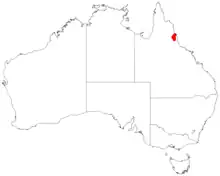| Prostanthera clotteniana | |
|---|---|
| Scientific classification | |
| Kingdom: | Plantae |
| Clade: | Tracheophytes |
| Clade: | Angiosperms |
| Clade: | Eudicots |
| Clade: | Asterids |
| Order: | Lamiales |
| Family: | Lamiaceae |
| Genus: | Prostanthera |
| Species: | P. clotteniana |
| Binomial name | |
| Prostanthera clotteniana | |
 | |
| Occurrence data from AVH | |
| Synonyms[1] | |
| |
Prostanthera clotteniana is a species of flowering plant in the family Lamiaceae and is endemic to tropical north Queensland. It is a shrub with cylindrical, hairy branches, narrow egg-shaped leaves with the narrower end towards the base, and purple to pale lilac flowers.
Description
Prostanthera clotteniana is an erect shrub that typically grows to a height of 1.5 m (4 ft 11 in) with hairy, stems. The leaves are narrow elliptic to narrow egg-shaped with the narrower end towards the base, dull green, 19–20 mm (0.75–0.79 in) long and 3–6 mm (0.12–0.24 in) wide on a petiole 2.5–5.5 mm (0.098–0.217 in) long. The flowers are arranged singly in two to four leaf axils near the ends of branchlet, each flower with bracteoles 3–5.5 mm (0.12–0.22 in) long near the base of the sepals. The sepals form a tube 3–4 mm (0.12–0.16 in) long with two lobes, the lower lobe 2.5–3 mm (0.098–0.118 in) long and the upper lobe 4.5–6 mm (0.18–0.24 in) long. The petals are purple to pale lilac, 15–18 mm (0.59–0.71 in) long and fused to form a tube 8–12 mm (0.31–0.47 in) long, the lower central lobe 6–8 mm (0.24–0.31 in) long and bilobed. The lower side lobes are 3–5 mm (0.12–0.20 in) long and the upper lobes are 2.5–4.5 mm (0.098–0.177 in) long and fused with a small central notch.[2][3][4]
Taxonomy
In 1904, Frederick Manson Bailey formally described Hemigenia clotteniana in the Queensland Agricultural Journal[5] and in 1905 described Prostanthera atroviolacea in the same journal, specimens of both plants collected near Herberton.[6] In 2000, Anthony Bean considered the two names to be synonyms and raised the new name Prostanthera clotteniana in the journal Austrobaileya.[7][8] The species was named "after F. E. Clotten, who furnished the funds for printing a general index to “The Queensland Flora”".[9]
Distribution and habitat
Prostanthera clotteniana grows in dry woodland on steep, rocky slopes in the Ravenshoe–Atherton area of north-east Queensland where it is only known from seven sites. It was thought to be extinct until rediscovered in 1999.[4][8]
Conservation status
This species is classified as "critically endangered" under the Australian Government Environment Protection and Biodiversity Conservation Act and the Queensland Government Nature Conservation Act 1992. The main threats to the species are inappropriate fire regimes and habitat disturbance caused by mining, illegal collection and weed invasion.[3][4]
References
- 1 2 "Prostanthera clotteniana". Australian Plant Census. Retrieved 27 August 2020.
- ↑ Conn, Barry J.; Wilson, Trevor C. (12 January 2015). "Prostanthera (Lamiaceae) from far-north Queensland, Australia". Telopea. 18: 3–6. doi:10.7751/telopea20158145.
- 1 2 "Species profile—Prostanthera clotteniana". Queensland Government Department of Environment and Science. Retrieved 27 August 2020.
- 1 2 3 "Prostanthera clotteniana (a shrub)" (PDF). Australian Government Department of the Environment. Retrieved 27 August 2020.
- ↑ "Hemigenia clotteniana". APNI. Retrieved 27 August 2020.
- ↑ "Prostanthera atroviolacea". APNI. Retrieved 27 August 2020.
- ↑ "Prostanthera clotteniana". APNI. Retrieved 27 August 2020.
- 1 2 Bean, Anthony R. (2000). "A new combination in Prostanthera Labill. (Lamiaceae)". Austrobaileya. 5 (4): 733–734.
- ↑ Queensland Agricultural Journal. volume 15. page 493. 1904.
